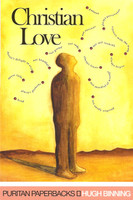
Binning, Hugh
Description
Love is the chief evidence of reconciliation with both God and with our brothers and sisters in Christ. This collection of Puritan treatises explains the duty and delight of Christian love, how it is rooted in divine grace, and the way it serves as a healing bond of peace.
Works included in this volume:
The Puritans have been unmercifully caricatured as stuffy, legalistic, insensitive, and irrelevant. You will discover nothing could be further from the truth in this collection of writings on Christian love for others.
Contents
The New Commandment Renewed by Ralph Venning
Letter to the Reader
Part 1
Part 2
Part 3
Part 4
Love One Another by Thomas Manton
The Nature and Principles of Love, as the End of the Commandment by Joseph Caryl
Sermon 1
Sermon 2
The Holy Exercise of Love by John Ball
About the Authors
Ralph Venning was born in Devonshire about 1621. He received his bachelor's and master's degrees from Emmanuel College, Cambridge, in 1646 and 1650. He lectured at St. Olave Jewry in Southwark until he was ejected along with two thousand other Puritans by the Act of Uniformity in 1662. He died in 1674 and was buried at Bunhill Fields, the nonconformists' burial ground.
Thomas Manton was born in 1620 in Somerset and graduated from Wadham College, Oxford, in 1639. Both his father and grandfather were ministers. He succeeded Obadiah Sedgwick at St. Paul's, Covent Garden. Manton died in 1677.
John Ball was born in 1585 and was educated at Brazenose College, Oxford. Ball was thoroughly learned in the controversies of his day, particularly those concerning Bellarmine and the Papists, the Arminians, and the issue of nonconformity. He ministered at Whitmore in Staffordshire and died in 1640.
Best known for preaching on Job for twenty-five years, Joseph Caryl was born in London in 1602. He graduated from Exeter College, Oxford, and preached at Lincoln's Inn. After being ejected in 1662, he gathered a congregation by London Bridge. He died February 7, 1673. After his death, his church chose John Owen as his successor.